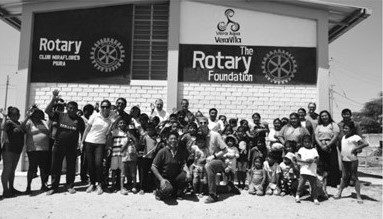
UD alumni utilizing their education
In a world where the availability of clean water defines the boundary between survival and crisis, Vera Aqua Vera Vita (VAVV) emerges as a beacon of hope and action. Founded with a profound vision by Purdue graduate Jacob Niemeier, this nonprofit organization is not just addressing the water crisis but is redefining the approach to sustainable solutions through community empowerment and the foundational principles of Catholic Social Teaching (CST).
The global water crisis represents one of the most pervasive and challenging issues of our time. Lack of access to clean water precipitates chronic and often fatal health problems due to waterborne diseases and instigates a cascade of socio-economic repercussions. For countless communities, the daily task of water retrieval consumes hours, typically requiring young women and girls to journey to remote sources. This not only exposes them to potential dangers along the way but significantly reduces their time for education and work, perpetuating a gendered educational gap that hinders community development generation after generation.
“Lack of access to clean water affects many aspects of life including, obviously, health but also when people are sick all of the time their ability to be productive and contributing members of society is greatly diminished,” Niemeier wrote. “For instance, think back to the times that you have been sick, whether this was when you were in school or on a job, how well were you able to focus, learn, work, etc.? Now imagine, having chronic diarrhea and thus constant dehydration and exhaustion due to having no choice but to consume contaminated water […] Lack of access to clean water is extremely detrimental to economic and societal development.”
The inception of VAVV was driven by Niemeier’s realization that solving the water crisis required more than just technical solutions; it needed a model that empowered communities to take ownership of their futures. This vision led to creating an organization that partners with communities, involving them in every step of the decision-making process to ensure the sustainability and local ownership of water projects.
Central to VAVV’s mission is the belief in the dignity and potential of every individual. By involving communities directly in project planning and execution, the organization not only builds water solutions but also fosters a sense of ownership and responsibility. This empowerment model encompasses tailored training and education, equipping community members with the knowledge and skills needed to maintain and manage these water systems, thereby ensuring their long-term success and sustainability.
“Lack of access to clean water is rooted fundamentally in recognizing that sustainable solutions are the key to lasting change,” Niemeier wrote. “To ensure this, the people who are the beneficiaries of the solutions have to be empowered and equipped to be a part of the solution and eventually take ownership of their solutions.”
The organization’s commitment to empowerment and sustainability is embodied by its staff, including University of Dallas alumni Ricardo Arbulu Guerra and myself. Our work at VAVV exemplifies how UD’s education in the True, Good and Beautiful can be applied to real-world challenges, transforming lives and communities.
“The most important impact of our work is that it makes people’s life easier so in that way they can allocate more hours to school and work, which gives more room for them to have more readiness and availability for spiritual activities and consequently improved spiritual life,” Guerra wrote. “With [access to clean water], it’s easier for them to partake in church and sacraments and to have an overall easier and improved spiritual life and friendship with Christ.”
VAVV’s approach is deeply informed by CST, emphasizing the inherent dignity of the human person and the importance of community participation.
“The CST principles of Solidarity (walking alongside) and Subsidiarity (empowering the people to be self-sufficient at the lowest operational level possible) are absolutely essential in inspiring our Mission,” Niemeier wrote. “Because they are truly the key to sustainable solutions!”
For the University of Dallas community, VAVV offers a vivid example of how education can be leveraged to address global challenges. The organization’s model of community empowerment and sustainable development serves as a call to action, encouraging students and alumni to apply the principles of the True, Good and Beautiful in their own lives to make a meaningful difference in the world.
As VAVV continues to bring clean water and hope to communities worldwide, its story underscores the transformative power of education, community engagement and the unwavering belief in the dignity of every person. Do you feel called to learn more about VAVV’s mission and what you can do to help? Visit our website at GiveTrueWater. org and learn how you can get involved with service projects, internships, volunteering and International Missionary Opportunities to serve those who lack access to clean water!